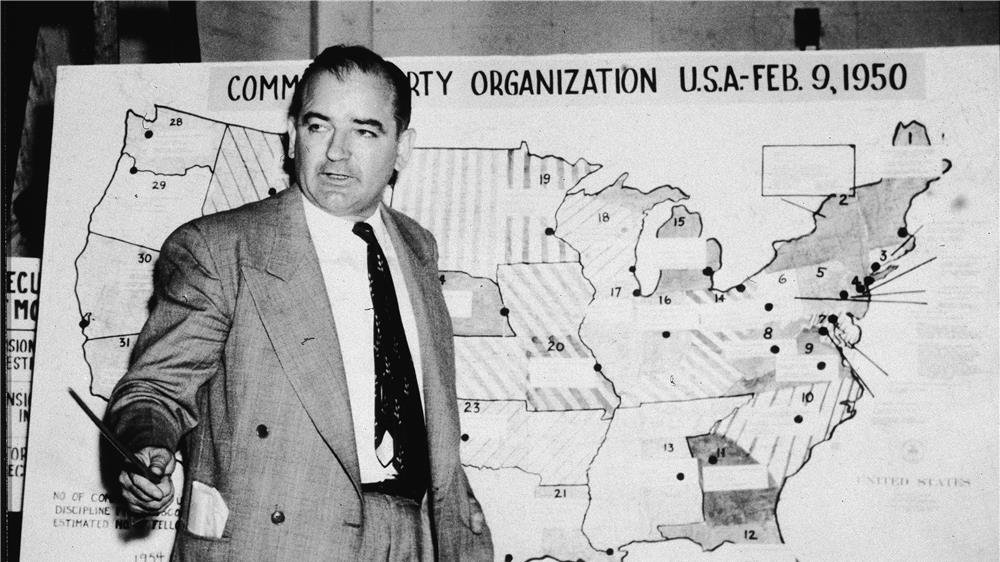في واحدة من أكثر الفترات قلقا في تاريخ الولايات المتحدة المعاصر (بعد أحداث 11 سبتمبر/أيلول 2001 والحرب على العراق)، عرض فيلم "ليلة طيبة وحظا سعيدا" للمخرج جورج كلوني الذي قام بالتمثيل فيه إلى جانب كتابة نصه مع غرانت هيسلوف. يروي هذا الفيلم قصة صراع الصحفي إدوارد مورو مع جوزيف مكارثي، أشرس عضو يميني في الكونغرس الأميركي في الفترة ما بين عامي 1947 و1957، وهو الذي قاد حملات واسعة للتخلص من خصومه السياسيين فراح يتهمهم بموالاة الشيوعية. كان من أبرز ضحايا هذه السياسة المكارثية جمهور واسع من الصحفيين والكتاب والإعلاميين والمثقفين. يمكن القول إن الفيلم -مع أنه في ظاهره كان سيرة ذاتية- قد فتح أحد أهم الملفات الشائكة في الصحافة.. وهو علاقة الإعلام بالسلطة.
مكارثي الذي جاء في طليعة المحافظين مطلع خمسينيات القرن الماضي، وجد بيئة خصبة لتحقيق طموحاته الشخصية إبان الحرب الباردة. فالظروف السياسية المحيطة بالولايات المتحدة مع تفشّي حالة "الرعب الأحمر" من تمدد الاتحاد السوفياتي، أو التخوّف من ضربات نووية في بلد لم يتعافَ بعدُ من تبعات "الكساد الكبير"، شكّل كل ذلك حاضنة لتحقيق المآرب السياسية، حيث أصبح مكارثي المُخلّص المنتظر من شرّ الشيوعيين وأفعالهم، مما أكسبه تعاطفا شعبيا واسعا، ودعما سلطويا نافذا ضرب به كل أعدائه وحاصر به جلّ الحريات، خاصة الصحفية منها.
اعتمد مكارثي في سياسته المقيدة للصحافة على صناعة الرعب وتزوير الحقائق والتشهير بالمعارضين وشيطنة كل الآراء المناهضة له تحت تهمة "معاداة أميركا" والتواطؤ مع الاتحاد السوفياتي. وتعاظمت الملاحقات الأمنية للجنة مكارثي حتى سميت تلك الحقبة باسمه (المكارثية)، ومن هنا أضيف هذا المصطلح إلى قاموس السياسة والإعلام لتوصيف أي عمل يقوم به شخص ما أو جهة بعينها لترهيب الآخرين ثقافيا أو ملاحقة من يعتنق فكرا مناوئا للسلطة.. أفعال من شأنها اغتيال الخصوم السياسيين معنويا. ومن أبرز ضحايا المكارثية آنذاك الكتاب الصحفيون والمثقفون من أمثال الممثل والمخرج شارلي شابلن، والموسيقار السينمائي ألمر برنشتاين، وعالم الفيزياء ألبرت آينشتاين، والروائي هوارد فاست، وغيرهم.

الصحافة المناهضة للمكارثية موضوع فيلم "ليلة طيبة وحظا سعيدا". إدوارد مورو صحفي بارع حاول استئصال السرطان المتفشي في كبد الصحافة بسبب السياسات التضليلية التي انتهجت آنذاك، خاطر مع مجموعة من الصحفيين المحترفين بمستقبلهم المهني لمواجهة الاستبداد المكارثي، إذ أقدم مورو ومن معه بعرض خبر لاذع ينتقد القائمة السوداء التي فرضها مكارثي على المواطنين الأميركيين. وقد اعتبرت خطوة مورو هجوما غير مسبوق، حتى إن رئيس محطة "سي.بي.أس" آنذاك وليام بالي أخبره بوضوح بأن "عملك بالأساس هو قراءة الأخبار، وليس من شأنك صناعتها"، إلا أن مورو بحسّه الصحفي ووعيه الكبير كان يؤمن بدور أكبر يحتم عليه الحراك في حال تلمس الخطأ.
من هنا بدأت ملحمة الصراع بين الصحفي والسلطة. الفيلم الذي عرض باللونين الأبيض والأسود سيعيدك إلى فترة الخمسينيات مباشرة، لكنه لن يدعك تفلت دون عقد مقارنة مع واقع الصحافة اليوم، وما آلت إليه في الإعلام الأميركي أو في إعلام المنطقة العربية، خاصة في الفترات الحرجة التي صاحبت موسم الهجرة إلى الثورات.
"نحن الآن أثرياء مرتاحون وراضون، ولكن لدينا حساسية ضد المعلومة غير السارة أو المقلقة.. إعلامنا الجماهيري الاستهلاكي يستغل هذا بشكل رئيسي لصرف انتباهنا وتضليلنا وتسليتنا وعزلنا.. إن التلفاز وأولئك الذين يمولونه ويشاهدونه ويعملون فيه، سيرون الحقيقة مختلفة كليا بعد فوات الأوان". بدأ الفيلم بهذه الكلمات الحاسمة التي غلب عليها الهدوء على لسان مورو في حفل تكريم له نهاية العام 1958 بعد معركته الطويلة مع جوزيف مكارثي.
يقول "نحن لسنا منحدرين من سلالة رجال جبناء خائفين، خائفين من الكتابة، خائفين من المشاركة، خائفين من الكلام ومن الدفاع عن القضايا التي آمنوا بها.. لم يعد هناك مجال للسكوت". كأن مورو بخطابه يلقي وصية المقاتل فيما اعتقد أنه الدور الذي يجب على الصحافة تأديته، سلطة تكشف الحقائق أمام زيف الأكاذيب المدمرة.
اختفى ذكر السيناتور اليميني، لكن المكارثية لم تغب.. يمكننا تلمس تنامي هذه الظاهرة من خلال نتائجها المنعكسة على أرض الواقع، خاصة مع تصاعد اليمين لدى المحافظين الجدد في ظلّ فراغ سياسي ملموس، ورواج واسع لنزعات التطرف المتعاظمة مع موجات الاحتراب الممتدة في مختلف أنحاء العالم.








































